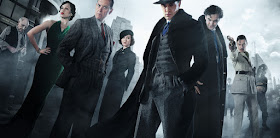 |
| ITV’s Jekyll and Hyde |
By the final episode of ITV’s adaptation of Jekyll and Hyde, viewers might be forgiven for wondering if there’s any connection between the series and Robert Louis Stevenson’s 1886 novella other than the title. Set in 1930s London, the series has found room for plenty of violence, a menagerie of CGI beasts and monsters, an X Files-style secret government organisation, and a demon named Lord Trash.
But the freedom with which writer Charlie Higson has adapted the story is nothing new. Stevenson’s Strange Case of Dr Jekyll and Mr Hyde is one of several late Victorian texts (Bram Stoker’s Dracula, Oscar Wilde’s The Picture of Dorian Gray, the Sherlock Holmes stories) that have been so frequently adapted that the leading characters have taken on lives of their own.
Stevenson’s novella is based on a concept that’s now so widely accepted as to verge on cliché: the notion that there is a hidden aspect of mind and personality that operates outside conscious control and that is potentially dangerous and destructive. Anticipating 20th century theorists of the unconscious, such as Freud, Stevenson created, in the opposed figures of the respectable Jekyll and the dastardly Hyde, a personification of the duality of human psychology.
Hero or villain?
Like the numerous other adaptations of Stevenson’s book, the ITV series retains this central element of the story, if little else. The hero, Robert Jekyll (Tom Bateman) is the grandson of Stevenson’s Henry Jekyll. He is a mild-mannered doctor who, when angry or stressed, undergoes a transformation in which he loses his inhibitions and acquires superhuman strength. Basically, he’s the Incredible Hulk.
Most of Stevenson’s novella is narrated from the perspective of characters other than Jekyll. This means that he remains a remote figure for readers, his personality and motivations hidden until the book’s final pages. In contrast, adaptations (including this one) typically tell the story from Jekyll’s perspective: viewers see and share his mixed feelings and his abhorrence of his alter ego Hyde, and so are invited to sympathise with him.
In the ITV series this effect is heightened. Robert Jekyll has (somehow) inherited his condition from his grandfather, and so is presented as an innocent victim, rather than someone who has caused his own suffering through an injudicious pursuit of forbidden knowledge.
This Jekyll, like the protagonists of many other adaptations, is a sort of everyman; as Higson commented in an interview before the broadcast of the first episode, “it is an idea that we can all relate to … we are all the monster”. ITV’s Jekyll is unambiguously a hero, a basically nice guy who struggles (but sometimes fails) to control his violent impulses and anti-social feelings.
Blood and gore
When he lets those feelings loose and morphs into Hyde, the results are spectacular. There’s a fair amount of violence, which switches between the cartoonish (an aggressive Hyde effortlessly throwing anonymous villains through the air) and the brutal (the series has featured shootings, rotting corpses, and a plethora of monstrous demons). This emphasis on spectacle, and particularly on the use of special effects, is another consistent feature of screen adaptations.
The producers of the ITV series evidently hoped that the action scenes and supernatural beings would form part of its Sunday-teatime, fun-for-all-the-family appeal: before the first episode, Higson described the series as “fantasy” and compared it to the X-Men films, Indiana Jones, and Tintin. But he and ITV had to issue an apology after hundreds of viewers complained to Ofcom that the opening episode was too scary and unsuitable for children.
It is true that some of the monsters and demons in the series are genuinely grotesque, but the special effects can’t manufacture the most striking quality of Stevenson’s book: its persistent sense of unsettling menace. There is very little violence in the novella, and characters are repeatedly unable to explain precisely why they are so appalled by the small, furtive figure of Edward Hyde. Only on two occasions – when he tramples on a child and when he attacks and murders an old man without provocation – does Hyde’s suppressed fury explode into violence. That violence is all the more shocking because of the restrained suspense with which Stevenson surrounds it.
The novella is a disturbing reflection on hubris and cruelty, but the ITV adaptation, like so many others, has dispensed with much of its seriousness. Watching the series has been fun (for the most part), but it’s no match for Stevenson’s original.
About Today's Contributor
Gregory Tate, Lecturer in Victorian Literature, University of St Andrews
This article was originally published on The Conversation. .
Jekyll and Hyde | Extended Preview
